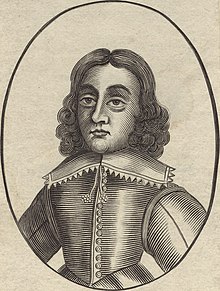James Hind
James Hind | |
|---|---|
| Born | c. 1616 |
| Died | 1652 |
| Cause of death | Royalist highwayman in English Civil War |
| Other names | John Hind |
| Occupation | highwayman |
| Parent(s) | Roger Kynaston and Elizabeth Grey |
| Conviction(s) | Murder |
| Criminal charge | treason, rather than highway robbery |
| Penalty | hanged, drawn and quartered |

Captain James Hind (sometimes referred to as John Hind) (baptised 1616, died 1652) was a 17th-century highwayman and Royalist rabble rouser during the English Civil War.
He came from the town of Chipping Norton, Oxfordshire. His partner Thomas Allen was captured when they attempted but failed to rob Oliver Cromwell. He also robbed John Bradshaw, President of the High Court of Justice for the trial of King Charles I.[1]
When finally caught during the Protectorate, Hind was charged with treason rather than highway robbery because of his expressed Royalist loyalty and was hanged, drawn and quartered in 1652 at Worcester.[2] He was the subject of a biography The English Gusman by George Fidge (London 1652), and 16 pamphlets detailing his exploits.
References
